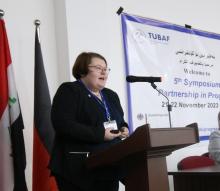This partnership has existed for 14 years - despite ongoing crises. TU Bergakademie Freiberg has been cooperating with Iraqi universities since 2009, above all with Salahaddin University in Erbil. A small delegation of TUBAF students and staff has just visited the northern Iraqi city and presented current research projects. This is a great opportunity for young researchers to gain conference experience abroad. But how does collaboration with partners located in a crisis area work?
Iraq is always in the global political headlines. The IS regime of terror, which massively affected the region around Erbil in particular, is unforgotten. Bundeswehr soldiers are still stationed in Iraq today. The security situation must be assessed before any university members plan to visit Iraq. In contrast to the rest of the country, the Federal Foreign Office has not issued a travel warning for the Kurdish-ruled north. "We wouldn't go to such an area lightly either," says Manuela Junghans, a member of staff at the Chair of Additive Manufacturing, who has already travelled to Iraq for the seventh time. "Careful planning of activities on site and personal support from members of the partner universities is always guaranteed."
Junghans was instrumental in setting up the university partnership in 2014 alongside Dr Abdulkader Kadauw. Dr Kadauw also works at the Chair of Additive Manufacturing under Prof Henning Zeidler. "The basis of our long-standing collaboration is our cooperation projects funded by the German Academic Exchange Service. These must be reapplied for after three years at the latest," he explains and Manuela Junghans adds: "Despite the threat of terrorism and occupied territories by IS, the cooperation has never been discontinued. The Iraqi partners really appreciate this. In addition to Salahaddin University Erbil, Al Nahrain University Baghdad, Koya University and Tishk International University deserve special mention. Every year, numerous Iraqi students, doctoral students, academics and technical staff visited TUBAF for further training or took part in on-site training courses for which TUBAF employees travelled to Iraq. During the coronavirus pandemic, the cooperation continued with online courses."

Regular exchange despite the crisis
Over the years, a lasting cooperation has developed between Freiberg and Erbil, which offers attractive programmes for young scientists from both sides: Iraqi students regularly visit TUBAF for summer schools and courses. And Freiberg students and doctoral candidates have been able to present their work at symposia three times so far, such as this November. Vanessa Rucks, a Bachelor's student on the Additive Manufacturing programme, was the first TUBAF speaker at the "Partnership in Progress" symposium. She gave her presentation on the topic of "Utilising biological raw materials for additive manufacturing". Another presentation was given by Katja Sandmann, research assistant at the Chair of Additive Manufacturing. She presented the initial results of her research project on "Paste extrusion with geopolymer composites to protect critical underwater structures". "It's the opportunity to do very practical work while studying that distinguishes the training at TUBAF from that in Erbil," explains Dr Kadauw. And in terms of a good partnership, it is only logical to export some of this practical experience: The "Glückauf Lab" has existed at Salahaddin University since 2014, where Iraqi students can gain practical experience on 3D printers and CNC machines.